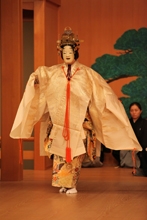 On Saturday April 12, 2014, as part of the 125th Anniversary of the Consulate General of Japan in Vancouver, the Consulate and Tomoe Arts, in cooperation with the Komparu School of Noh, presented a full performance of the Japanese noh drama Hagoromo (The Feathered Robe). Led by internationally acclaimed noh actor YAMAI Tsunao, a troupe of 11 performers and musicians from Japan came to Vancouver to perform this play with gorgeous brocaded kimono, hand-carved masks and traditional chant and drumming.
On Saturday April 12, 2014, as part of the 125th Anniversary of the Consulate General of Japan in Vancouver, the Consulate and Tomoe Arts, in cooperation with the Komparu School of Noh, presented a full performance of the Japanese noh drama Hagoromo (The Feathered Robe). Led by internationally acclaimed noh actor YAMAI Tsunao, a troupe of 11 performers and musicians from Japan came to Vancouver to perform this play with gorgeous brocaded kimono, hand-carved masks and traditional chant and drumming.
Noh is a highly stylized form of dance-drama that has been practiced continuously in Japan for over 600 years. It tells stories of ghosts, angels, demons, warriors and noblewomen through dance, chant, drumming, stunning costumes and beautiful masks. Although many women practice the form today, noh actors are traditionally men, and all actors begin training as children or teenagers, becoming a “seasoned” professional only in their forties or fifties.
Yamai Tsunao is a member of the Komparu tradition or school of noh. He has a mission to introduce noh to audiences outside Japan, and is also involved in innovative work combining noh with other forms of music and performance.
Tomoe Arts is a Vancouver dance-theatre company that promotes traditional Japanese arts and creates contemporary dance-theatre performances incorporating Japanese aesthetics. TomoeArts’ artistic director Colleen Lanki studied traditional theatre and dance in Tokyo, and the company is honoured to be able to bring such esteemed master noh artists to Vancouver.
Angels, fishermen and a magical feathered robe in this fully costumed, full-length performance of a Medieval Japanese noh drama
“I will gladly dance, for those who inhabit this sad, lower world”
The story of Hagoromo (The Feathered Robe) tells of an angel who descends to earth from her home in the heavens. As she is bathing, a fisherman named Hakuryô steals her feathered robe from the pine tree it hangs on, taking away her ability to fly. She begins to die for longing to return to the sky, and begs Hakuryô to return her robe, but he will only do so if she shows him the dances of the heavens. She promises to dance, insisting he return her robe first. He refuses, saying that he does not trust her because she would simply fly away without dancing. The angel then shames him with the most famous passage in the play, “No, no, suspicion is only for humans. In Heaven, deceit is unknown.” Hakuryô returns her feathered robe and she dances her way to her celestial home.
Also in the evening’s performance, KOMPARU Norikazu the next head of the Komparu School of noh, performed an excerpt of chanted music from Okina, the oldest and most sacred play in the classical noh repertoire.